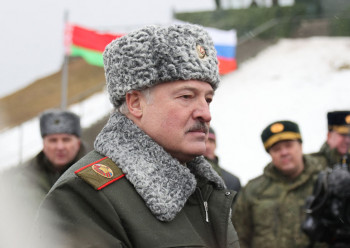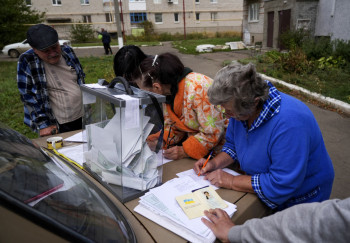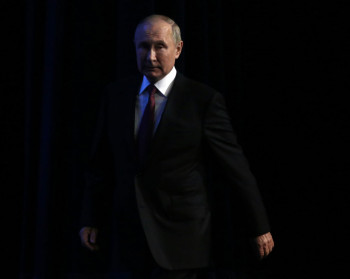Belarus Weekly: Minsk prepares railroads for potential incoming Russian troops, military equipment
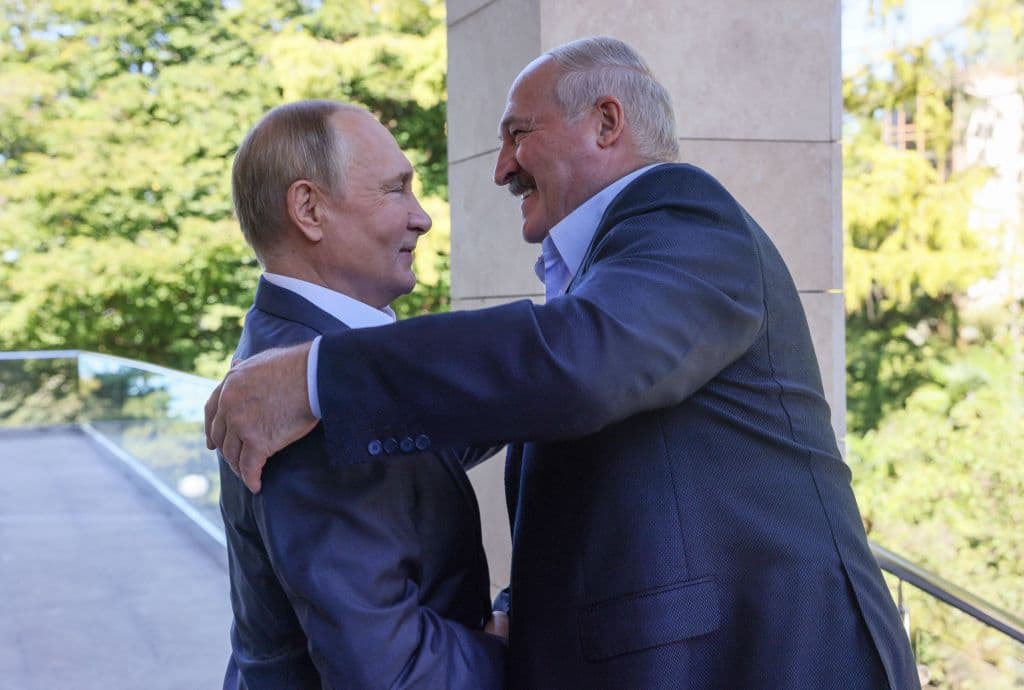
Belarusian dictator Alexander Lukashenko met with his Russian counterpart Vladimir Putin in Sochi on Sept. 25.
Lukashenko told Putin there's no point in going after those that flee Russia's mobilization decree. "Let them run," the dictator said.
Meanwhile, Belarus refrains from directly following Russia's footsteps, yet still announcing "mobilization" drills at one of its air bases.
Minsk also prepares its railroads to receive new Russian military echelons and instructs its law enforcement to keep watch for Russian citizens that have fled forced conscription back home.
Across the aisle, exiled Belarusian opposition leader Sviatlana Tsikhanouskaya condemns Russia's sham "referendums" in Ukraine's occupied territories as Lukashenko's regime remains silent.
Belarus' human rights activists are threatened with up to 12 years in prison, while the country's prosecution launches its first investigation in absentia against several Belarusian citizens who fled the country fearing repression.
Belarusian railroad prepares to handle influx of Russian military trains
The independent union of Belarusian railroad workers leaked information about ongoing preparations to accommodate additional Russian trains, most likely carrying troops and weapons.
According to the leaked information, the Belarusian railroad inspects train stations and communication equipment, checks the tracks, and coordinates train schedules with the Russian railroad operator and military.
Belarus railroad workers are forced to sign non-disclosure agreements until Sept. 30.
Yezerische and Asinauka in the north and Zakopytye in the south are reported to be the primary border crossings tasked with accommodating Russian echelons. Siarhei Vaitsekhovich, the representative of the democratic "Workers movement" (Rabochy Rukh), noted that these procedures are typical for the mass transfer of machinery.
He added that the same procedure occurred before the February full-scale Russian invasion. Russia used Belarusian railroads to conduct a surprise invasion from the north.
Lukashenko meets Putin in Russia for 7th time this year
An unannounced meeting between Lukashenko and Putin took place on Sept. 26 in Sochi, Russia.
While the details of their talks were not disclosed, Lukashenko mentioned trade, sanctions, and Russian mobilization.
Lukashenko noted the possibility of a $1.5 billion loan from Moscow to support Belarusian economy. He emphasized that Belarus will "fly its own planes, drive its own cars."
He also claimed that, since Russia has 25 million people available for conscription, there is no point in going after those that flee mobilization. "Let them run," he said.
It was the seventh time Lukashenko and Putin met in 2022.
Belarusian political analyst Aliaksandr Klaskouski suggests that Lukashenko may be trying to gain financial assistance from Moscow while it's still possible.
Minsk stays silent over Russian sham 'referendums' in Ukraine's occupied territories
Belarus' Foreign Minister Vladimir Makei avoided commenting on Russia's sham "referendums" in Ukraine's occupied territories in an interview with France 24.
While Belarus' Central Election Commission told Russian state-controlled media that its representatives are not taking part in Russia's pseudo-referendums in Ukraine, reports indicate that some "election observers" are Belarusian citizens.
For example, Belarusian propagandist Vadim Gigin was among the so-called "international observers" at the pseudo-referendum in Luhansk Oblast.
Belarusian opposition leader Sviatlana Tsikhanouskaya's United Transitional Cabinet, an opposition shadow cabinet, said it condemns Russia's sham "referendums."
Valery Kavaleuski, Tsikhanouskaya's foreign affairs representative, said any recognition by Belarusian authorities of Russia's actions will be considered a "state crime" harming Belarus' national security.
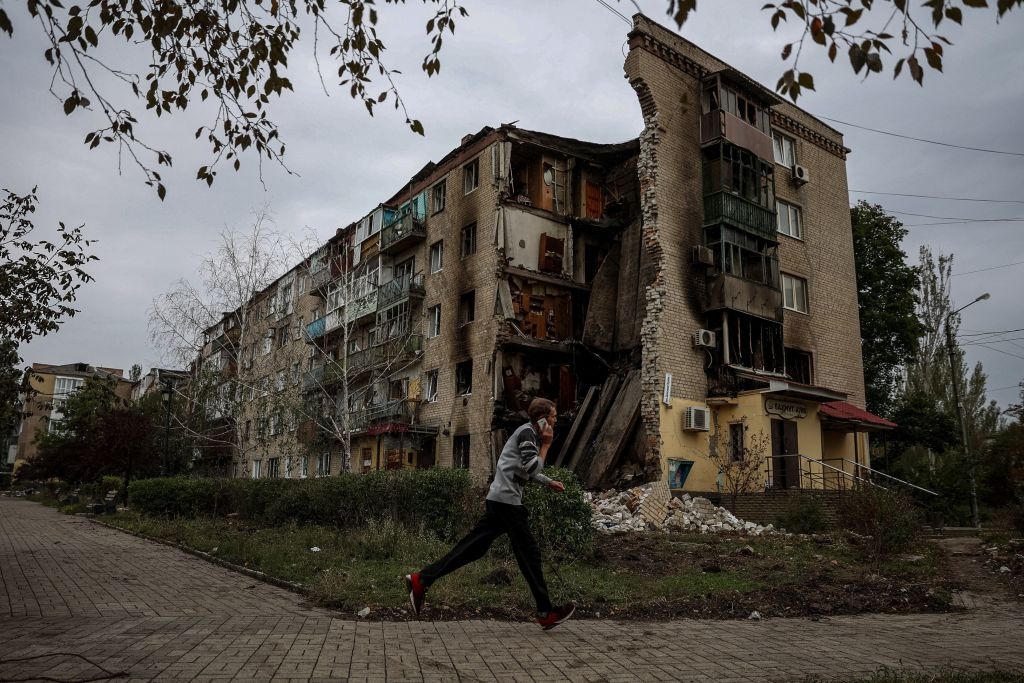
A man runs in front of a destroyed apartment building in Bakhmut, Donetsk Oblast on Sept. 26, 2022. (Getty Images)
Belarus conducts sudden inspection of combat, mobilization readiness at Machulishchy air base
Belarus' Defense Ministry announced immediate inspections on Sept. 28 of the combat and mobilization readiness of the Machulishchy air base.
Inspections will center around topics of recruitment and training of conscripts and the removal of military equipment from storage for combat readiness.
Military exercises in Belarus have again been extended until Oct. 1.
Belarusian police instructed to identify Russian draft dodgers
Belarusian media report that Belarusian police and customs received oral instructions to identify and keep track of Russian men that came to Belarus to avoid mobilization.
Nasha Niva reported that police must check passports at railway stations, monitor short-stay rental premises, and cars with Russian license plates. Deutsche Welle reported that checks are also conducted at Minsk-2 airport.
After mobilization was announced in Russia on Sept. 21, 261,000 Russian citizens fled the country to avoid conscription. Many fled to Belarus, which has no border with Russia but closely cooperates with Russian law enforcers. The Russian FSB is said to install temporary checkpoints and take five Russian citizens off the train heading to Minsk.
In the aftermath of the announcement, the tickets for trips to Belarus were sold out, and hotels were overbooked. Belarusian BYSOL, which helps political opponents of Lukashenko to flee Belarus, reports that they received seven times the average number of requests for assistance with relocation.
On Sept. 26, at the meeting with Putin, Lukashenko suggested that Russia has 25 million people to draft and should not go after those who fled.
Belarusian volunteer with Ukrainian military killed in Bakhmut, Donetsk Oblast
A Belarusian volunteer fighting for Ukraine as part of the Pahonya regiment was killed on Sept. 26 while defending positions near Bakhmut, Donetsk Oblast.
This is the first recorded death in the Pahonya regiment. The soldier with the military call sign "Reaper" has fought for Ukraine since 2016.
Ukrainian activists have petitioned to grant the volunteer Ukrainian citizenship posthumously. President Volodymyr Zelensky noted that a move towards giving volunteers that fight for Ukraine citizenship is in the works.
Since the start of Russia's full-scale war against Ukraine, 14 Belarusian volunteers fighting against Moscow have been killed in action.
First investigation in absentia leading to citizenship revoking begins in Belarus.
On Sept. 27, the Belarusian investigative committee launched the first investigation in absentia that might lead to deprivation of citizenship for five accused Belarusians.
This case is intended to set a precedent of nullifying citizenship for the regime's opponents in exile.
Dmitry Navosha, Yanina Sazanovich, Daniil Bagdanovich, Volha Vysotskaya, and Valeriya Zaniamonskaya are accused of "extremism" by revealing the identities of Belarusian law enforcers responsible for the brutal crackdown on protesters in 2020.
All five were active in the themed Telegram channel The Black Book of Belarus. The trial might result in up to 12-year imprisonment if caught, revoked citizenship, and arrest of property.
Legislation allowing trials in absentia for "extremists" was introduced on July 27. Lukashenko's regime plans to broaden the reasons for which Belarusians may be deprived of citizenship.
Lukashenko's regime 'pardons,' releases 3 political prisoners
Three Belarusian political prisoners were released from jail after reportedly being pardoned by Lukashenko.
Journalist Aleh Hruzdzilovich, human rights activist Tatsiana Lasitsa, and Halina Mikhalchuk received a pardon on the week of Sept. 19, two weeks after Lukashenko said he would grant amnesty to prisoners who "really deserve it" on Sept. 17, Belarus' National Unity Day.
He claimed that those arrested during protests in the aftermath of the fraudulent 2020 Belarusian presidential election would also be considered for amnesty. At least 8,000 people may reportedly be granted amnesty.
However, no official documents have yet been published in relation to Lukashenko's statement.
While three prisoners were released, Minsk is mounting pressure against those who oppose Lukashenko's regime. Three human rights activists connected to Belarusian human rights watchdog Viasna have received new charges.
Ales Bialiatski, Valiantsin Stefanovich, and Uladzimir Kabkovich were accused of allegedly smuggling large sums of money across the border to finance anti-government protests, which is punishable by 12 years in prison.
Belarusian singer may face criminal investigation for singing Ukrainian song
Belarusian singer Meryem Herasimenka may face a criminal investigation for singing a song by Ukrainian band Okean Elzy.
Herasimenka was detained for 30 days in early August after performing a song by the band on Minsk's Zybitskaya Street. According to Belarusian human rights watchdog Viasna, Herasimenka is being held at a pre-trial detention center.
Belarusian law enforcement published a recording in which she appears to confess to participating in the protests that followed the fraudulent 2020 presidential elections and donating to the Ukrainian military.
Following her detention, Belarusian authorities have reportedly arrested several street performers.

